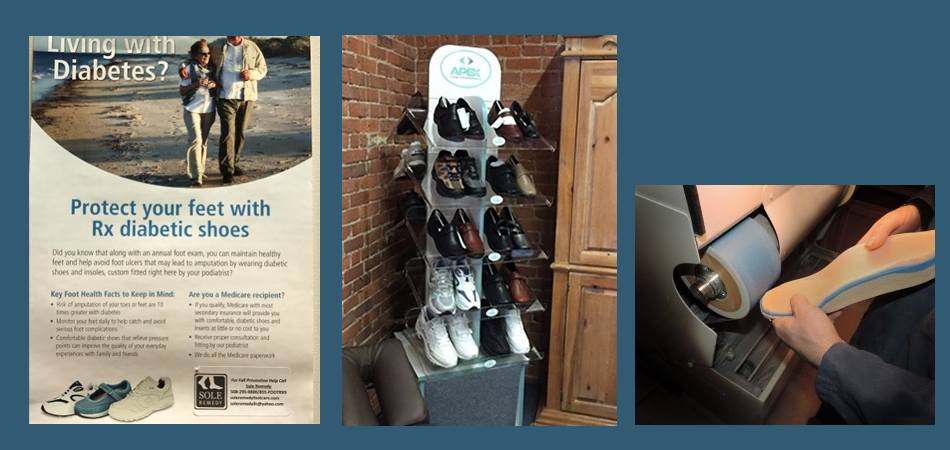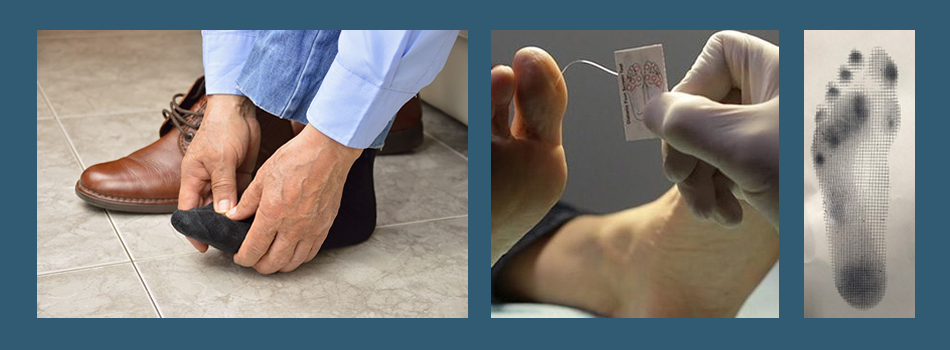Poorly fitting shoes are the primary reason people with diabetes are at increased risk for skin breakdown, foot ulceration, and infection. Even a small cut or blister can have serious consequences. Complications related to diabetes can result in amputation of the foot or leg. The good news is that patients with diabetes may be eligible to receive diabetic shoes and inserts through their health insurance. In 1998, Congress passed the Diabetic Therapeutic Shoe Bill, which made it possible to provide depth shoes and custom inserts, funded by Medicare, to patients with diabetes. Most insurance companies follow a similar program.
Check with your insurance company to verify benefits and whether you qualify to receive diabetic shoes and inserts. Also, check to see what your financial responsibility will be if you receive shoes. If qualified, Medicare will pay 80% of the cost of the shoes and inserts. Patients who do not have secondary insurance will be responsible for 20% of the payment due at the time of dispensing.

Proper fitting footwear, shoe environment, and skincare are essential in keeping diabetic feet healthy.
Sole Remedy is an accredited pedorthic facility and provider of diabetic footwear and inserts to qualified patients. Sole Remedy is also a provider of skincare products that are specific to the unique characteristics of diabetic feet. If you suffer from dry cracked skin, scaly, itchy, or sweaty feet, we can help!
Patients with diabetes may be eligible for footwear and inserts through the Medicare Therapeutic Shoe Program with little or no cost to the patient. Patients with private insurance may also qualify for similar coverage under their own plans. Proper fitting shoes and inserts are the keys to preventing foot problems and wounds that are difficult to heal in diabetic patients. We can fit patients with any size, width, or condition including Charcot deformities. Custom shoes are also available if required.
In addition to proper fitting footwear, Sole Remedy can also do shoe modifications such as extrinsic heel/sole lifts for leg length discrepancies or flares as examples. We can also provide wound care products to protect and offload ulcers. Protect your feet from friction, callus build-up, and skin ulceration.
How Do I qualify for diabetic footwear under the Medicare Program or other insurance?
Most commercial insurance companies follow Medicare guidelines. Contact your insurance company directly to see if you qualify for therapeutic shoes under your insurance plan. Be sure to tell them you are diabetic.

Patients must have seen their physician within the past 3 months. All shoes and inserts must be dispensed within 6 months of their visit with the physician. Be sure to have your physician look at your feet, your gait, and check your sensation and circulation every time to visit them. Make sure your physician, nurse practitioner, or physician’s assistant document their findings in your chart. In order for diabetic shoes and inserts to be covered, your office notes must indicate your diabetic condition along with any calluses, wounds/ulcerations, and/or deformities such as hammertoes, claw toes, bunions, toes crossing, etc.
Medicare and most commercial insurances cover diabetic shoes, inserts, and modifications for program beneficiaries only if the following criteria are met:*
To Be Eligible For Diabetic Shoes and Inserts You Must:
- Have diabetic shoe coverage under your primary insurance
- Be under the care of a physician for diabetes
- Have a prescription from a physician (MD, DO) or podiatrist (DPM) for diabetic shoes and inserts
- Have a “Statement of Certifying Physician for Therapeutic Shoes” from your physician who manages your diabetes, which certifies that you are diabetic and are under a comprehensive plan to care for your diabetes.
- Have at least one of several foot conditions associated with diabetes mellitus:
-
- Pre-ulcerative callus formation or
- Peripheral neuropathy with the history of callus formation
- Foot deformity
- Poor circulation
- History of previous foot ulceration
- Previous amputation of the foot or part of the foot
-

Sole Remedy specializes in gait analysis, foot type assessment, musculoskeletal injury management, and fall prevention.
Phone: 508-295-8800 or 855-FOOT RX 9 to schedule an appointment today!
